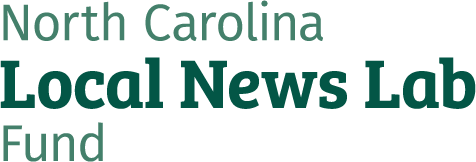Before Any Storm: Invest in News and Information Before Disaster Strikes
When Hurricane Helene hit Western North Carolina in September, local news leaders and trusted communicators sprung up to help people. Six months later, they helped their communities navigate yet another emergency when wildfires rapidly spread across the region.
Their vital work makes this lesson abundantly clear: funding local news and information before disaster strikes is not only helpful – it’s lifesaving.
These floods and fires are not isolated incidents. Since I joined the North Carolina Local News Lab Fund in 2019, we’ve seen our fair share of emergencies. Time and again, our local news leaders and trusted communicators respond and adapt. They work to ensure people are safe and get their questions answered in clear language. And they stick around after the crisis fades from the national headlines, helping people make sense of recovery, policy changes, and what comes next on the local level.
The information system is essential for navigating daily life in disorienting times, and the organizations that compose it are under increasing pressure.
Here’s what I’ve learned about why and how, in moments like these, funders must think beyond reactive funding and instead build resilience in advance.
Solutions need fuel before a crisis.
The nonstop demands of the past five years have stretched teams to their limits, and uncertain funding adds further stress. When flexible funding is available before an emergency, organizations can respond swiftly and effectively.
We saw this firsthand with our 2019 hurricane relief grant recipients. We invested in trusted organizations with deep community ties alongside trusted newsrooms, and these grant partners ensured that local voices were heard, even when people felt forgotten and ignored. And they didn't just cover the immediate aftermath of the storm — they accompanied communities through flood recovery and pivoted seamlessly into covering the COVID-19 pandemic a year later. Today, these organizations continue to apply what they learned during storms like Florence to their Hurricane Helene response. Rapid response funding is essential, but even more so is the continued general operating support that sustains and scales these efforts.
But funding alone isn’t enough. Organizations also need tools, expertise, and infrastructure to do their work safely and effectively. That's why, alongside our direct grants, the Fund also invests in capacity-building efforts—work that we’re continuing to expand to meet the field’s needs. Whether that’s funding Code the Dream’s accessible legislative tracking tool or NC Local’s work to help organizations launch text-only, low-bandwidth websites, our network-level approach means more organizations have access to critical resources that are otherwise financially out of reach.
Planning creates possibility.
Natural disasters and national policy are far beyond my control, even if they shape what happens in North Carolina and what information people need to navigate their lives. But there is plenty within our power. As I’ve written about before, staying grounded in place and local scale is our tested way through uncertainty.
The Fund uses a scenario planning worksheet to consider what’s at stake and what’s possible at the local level. The framework helps our team assess the anticipated political, environmental, and social risks of the year ahead, prioritize our focus areas, and determine how to respond —whether it’s by amplifying exceptional local coverage or making introductions when rapid response funding needs emerge.
Grounded in the knowledge of how to respond in moments of danger or uncertainty, we also seek out allies whose expertise and capacity complement ours. Whether we’re helping a grant partner navigate safety questions or investigating whether newsrooms are eligible for recovery funding, the goal of our collaboration is simple: make sure verified information flows to people who need it, including in philanthropy.
Planning ahead and engaging our allies leads to expanded aligned funding. For organizations, expanded funding means more time and organizational capacity to respond, and greater resilience across the news and information ecosystem.
Ready to build a scenario plan for your organization? Send me an email to get a copy of the worksheet the Fund developed to help get it started.
There’s a place for everyone in this work. Join us.
Funding local news and information is essential at every stage of an emergency, but organizations are far better prepared to handle disasters when they are well-funded before crises ever happen. The real benefits of investing in advance and responding with forethought are magnified when you do it collaboratively, patiently, and consistently—before, during, and after crises.
This values-driven work has a place for everyone to participate, and it requires that people bring their unique superpowers to the table. If you’re a funder who wants company as you navigate how you and your organization can contribute, send me an email.
